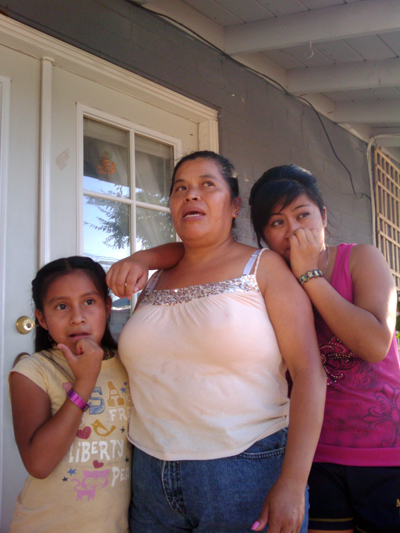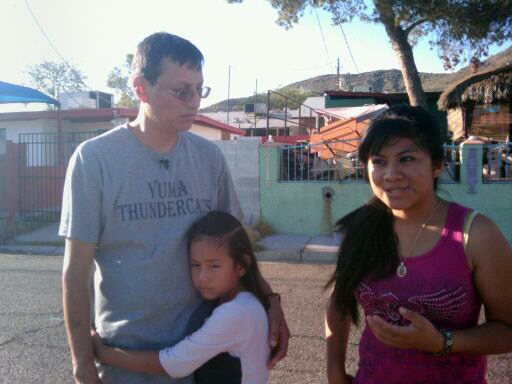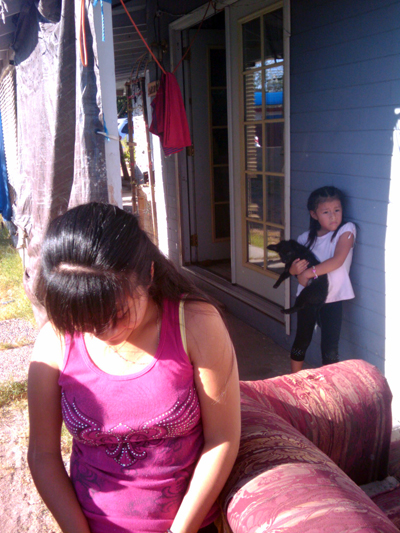
Amparo De Paredes (center) with two girls whose mothers were arrested in immigration raids. (Photo: Valeria Fernandez)
Arizona’s new law requiring local and state police to arrest suspected undocumented immigrants is scheduled to go into effect tomorrow, unless federal judge Susan R. Bolton rules otherwise.
Undocumented immigrants and their families in Arizona are living in limbo, and immigrants all over the nation are watching closely. ImpreMedia, one of the largest Spanish language news outlets in the U.S., launched a multimedia package this week focused on SB 1070 in an effort to clarify how the law will impact the Hispanic community. Visit Impre’s new site here.
Fi2W’s Valeria Fernandez has been following the situation in Arizona closely. The following article, written by Fernandez, appeared in the July 25 edition of La Opinión. Translation by Elena Shore of New America Media.
PHOENIX – Amparo De Paredes fills a giant bucket with bottles of water as a bunch of girls run around the house, playing with two adopted puppies.
They aren’t her daughters, but these days it feels like they are her own, especially since their mothers were arrested by the Maricopa County Sheriff’s Department in two raids on the Sizzler’s restaurant chain on June 12.
“I don’t have kids, but it touches my heart to see what is happening,” says Amparo, a 52-year-old Guatemalan immigrant.
As hundreds of immigrant families leave the state before the implementation of the new law, SB 1070, which makes it a state crime to be undocumented, those who stay are living in uncertainty.
“This is going to happen, whether or not the law goes into effect. There is going to be more crime. I can’t call the police; if I call the police, I’m the one that’s going to lose out, not the robber,” says Omar González, the father of four of the girls, and a native of Retalhuleu, Guatemala.
Blanca, his wife, wanted to stay until the last minute, to wait until July 29, the date the new immigration law goes into effect. Otherwise, the plan was to move to Los Angeles. They were afraid of being arrested in the street, but they never thought she would be arrested in the middle of a workday at the restaurant where she’s worked for 10 years.

Omar Gonzalez with his daughter. Her mother was arrested in a recent immigration raid at the Sizzler’s restaurant chain – Photo: Valeria Fernandez
“It’s useless. It’s stupid what they’re doing, because they are not protecting the city by kicking hardworking people out of their jobs,” says Gonzalez, 40. “They would be protecting the country if they caught the people who sell drugs in the streets.”
Gonzalez blames the Obama administration for what is happening in Arizona.
“How many years has this black man been president, and there have been more deportations than under Bush. What is he doing? Nothing. When passing immigration reform was important. No, he threw himself into passing health care reform.”
Amparo’s house has become a neighborhood meeting place, and this afternoon dozens of people are arriving on foot for a meeting of the PUENTE movement, where they will be educated about their civil rights.
“How many people here are illegal?” asks Alma Mendoza, a Mexican immigrant who leads the neighborhood groups in the area.
Some raise their hands shyly.
“How many are immigrants?” she asks. Others respond. Mendoza says to them, “We are not illegal. We are not undocumented. We are human beings.”
Mendoza reminds the guests that on July 29, they are calling for everyone not to go to work or buy anything. The PUENTE movement already has several vigils and acts of civil disobedience planned if the judge allows the law to go into effect.
Meanwhile, Amparo and her husband, José de Jesus, pass around bottles of water for their guests under Arizona’s scorching afternoon sun.
“We want to unite to get rid of the police. A lot of people are afraid,” says Amparo. A few months ago a new Phoenix police station opened near the church and the park. But instead of providing security, it is making people afraid because of the new law.
Omar complains that in the last few months, the same police officer has arrested him three times, and impounded his car each time.
The neighborhood meetings help people not to feel helpless. People from all parts of the country have come to visit them to help.
But for Omar, it is a double-edged sword.
“The more united we are, the better. But at the same time, the more united we are, the more we are making ourselves known to the law,” says the Guatemalan.

Young girls in Arizona whose mothers were arrested in immigration raids. (Photo: Valeria Fernandez)
After the federal government and a coalition of civil rights groups presented arguments to overturn parts of the law, everyone was betting that Judge Susan Bolton would impose a moratorium, at least on some aspects of SB 1070.
But with or without the law, the persecution of undocumented immigrants in Arizona can continue at the hands of Sheriff Joe Arpaio, who has said he is planning to conduct a raid on July 29. The controversial sheriff, who is under investigation for the use of racial profiling in his operations, also opened a special outdoor section in his so-called “Tent City,” where he will jail the undocumented immigrants he arrests.
“This law hasn’t even gone into effect yet and the community is already devastated,” says Luis Fernández, a member of the Repeal Coalition. For nearly a year and a half, the group has organized immigrant communities at the neighborhood level. It also visits family members in detention, connects them with lawyers, and accompanies them to court.
“Unfortunately, there is a huge need. What we are doing is a drop of water in the ocean,” he says. “The atmosphere is extremely polarized in Arizona and it is already expanding nationwide. I suppose that what we’re experiencing here is going to be felt elsewhere, especially in November [during the elections].”



